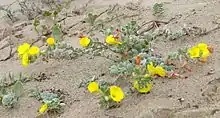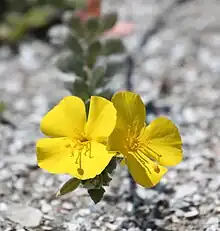Camissoniopsis cheiranthifolia
Camissoniopsis cheiranthifolia, the beach suncup or beach evening primrose, is a species of the evening primrose family and is native to open dunes and sandy soils of coastal California, Baja California and Oregon.
| Camissoniopsis cheiranthifolia | |
|---|---|
 | |
| Scientific classification | |
| Kingdom: | Plantae |
| Clade: | Tracheophytes |
| Clade: | Angiosperms |
| Clade: | Eudicots |
| Clade: | Rosids |
| Order: | Myrtales |
| Family: | Onagraceae |
| Genus: | Camissoniopsis |
| Species: | C. cheiranthifolia |
| Binomial name | |
| Camissoniopsis cheiranthifolia | |
| Synonyms | |
Description
The beach suncup grows prostrate along the beach surface, forming mats more than 1 m across. It forms long stems growing from a central crown, lined with silvery grey-green leaves. The prostrate form and swinging stems allow the plant to survive well on the windy, shifting sands of the coast. The four-petalled flowers open in the morning (typical among suncups) and are bright yellow, fading to reddish.
Taxonomy
This plant is a well-defined diploid (2n = 14) species that has varying floral traits over its geographic distribution.[1]
The specific epithet cheiranthifolia refers to the leaves having the appearance of Cheiranthus, an old name for a wallflower genus.[2]

The two subspecies are:
- Camissoniopsis cheiranthifolia subsp. cheiranthifolia – A perennial herb that rarely has dense and silvery hairs, distributed from the Channel Islands to Oregon. This subspecies is generally self-pollinated.[3]
- Camissoniopsis cheiranthifolia subsp. suffruticosa (S.Watson) W.L.Wagner & Hoch – A subshrub that generally has dense and silvery hairs, distributed from Baja California to Point Conception. This species is usually cross-pollinated and self-incompatible, and it hybridizes widely with Camissoniopsis bistorta.[4]
Distribution and habitat
This species grows on the coastal dunes and sandy soils from southern Oregon through California and southwards towards El Rosario in Baja California.[5]
References
- Dart, Sara R.; Samis, Karen E.; Austen, Emily; Eckert, Christopher G. (2012-02-01). "Broad geographic covariation between floral traits and the mating system in Camissoniopsis cheiranthifolia (Onagraceae): multiple stable mixed mating systems across the species' range?". Annals of Botany. 109 (3): 599–611. doi:10.1093/aob/mcr266. ISSN 0305-7364. PMC 3278294. PMID 22028462.
- "Plant of the Month - Beach Evening Primrose". Santa Monica Mountains Trails Council. Archived from the original on 2020-08-05. Retrieved 2022-01-17.
- Wagner, Warren L. (2012). "Camissoniopsis cheiranthifolia subsp. cheiranthifolia". Jepson eFlora. Jepson Flora Project. Archived from the original on 2021-05-18. Retrieved 17 January 2022.
- Wagner, Warren L. (2012). "Camissoniopsis cheiranthifolia subsp. suffruticosa". Jepson eFlora. Jepson Flora Project. Archived from the original on 2017-08-29. Retrieved 17 January 2022.
- Rebman, J. P.; Gibson, J.; Rich, K. (2016). "Annotated checklist of the vascular plants of Baja California, Mexico" (PDF). San Diego Society of Natural History. 45: 205.